Top ministers talk

Government leaders react to the news with the two sessions continuing in Beijing
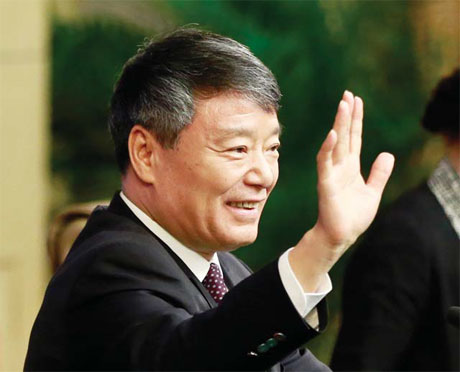
Xu Shaoshi, the minister in charge of the National Development and Reform Commission, China's top economic planner, speaking on March 6.
LAYOFFS: The restructuring of China's state-owned enterprises in the 1990s put tens of millions out of work. Researchers estimate about 3 million workers could be laid off in the coming two to three years if capacity is reduced by 30 percent in sectors such as steel, coal mining and cement. The Ministry of Human Resources and Social Security says 100 billion yuan ($15.3 billion; 13.9 billion euros) will be allocated to cushion the effect of job losses on families.
What he said:
"China will not have another layoff wave (like in the 1990s) as we reduce overcapacity in such sectors as steel and coal mining. The steel sector will reduce capacity by 100 to 150 million metric tons in five years, and the coal mining sector will cut capacity by 500 million tons, with another 500 million tons to be restructured in three to five years.
"On the whole, I'm optimistic about China's job market. First, some enterprises have taken measures including cutting working hours and salaries to avoid layoffs.
"Second, although China's growth speed has slowed, its economic aggregate is growing larger. One percentage point of growth in GDP now translates to an additional 1.6 million jobs.
"Third, the fast-growing service industry is a reliable source of job creation. Last year, the service sector accounted for 50.5 percent of China's GDP, the first time it has exceeded the 50 percent level.
"Fourth, the growing zeal for innovation and entrepreneurship means more people are starting their own businesses. Last year, 4.4 million new enterprises were registered. This translates to 12,000 a day.
"Fifth, with the development of social mobility and information exchange, it is easier and faster for people to find jobs that match their ability and interest."
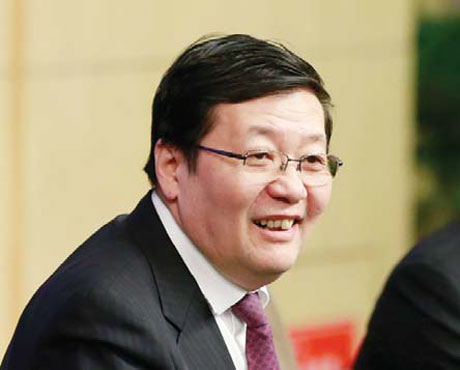
Lou Jiwei, the finance minister, speaking on March 7.
FISCAL DEFICIT: Last year, China eased the pressure on local governments by issuing 3.2 trillion yuan ($490 billion; 446 billion euros) in low-cost bonds to pay off their debt. According to official data, local-government direct debt has reached 16 trillion yuan, 600 billion yuan of which was incurred in 2015.
What he said:
"About 5 trillion yuan in local-government debt is due by the end of 2016, but we will arrange some debt-to-bond swaps for local governments so their debt will not cause a major concern. The contingent liability may increase amid an economic slowdown, and we need to strengthen supervision to prevent local governments from issuing debt off the balance sheet. So far, the ratio of Chinese government debt to GDP is about 40 percent, lower than in many countries."
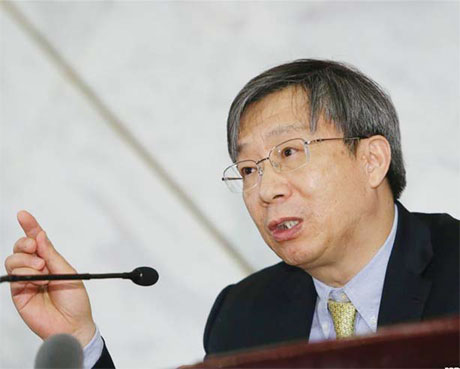
Yi Gang, vice-governor of the People's Bank of China, speaking on March 6.
INTEREST RATES, RMB: In the past, the central bank has managed interest rates by setting floors and ceilings, yet China has now scrapped caps on both loan and deposit interest rates. Exploring the option of an interest-rate corridor underscores efforts to further liberalize rates and support the slowing economy through more effective monetary policy.
What he said:
"China needs to improve the interest-rate system to enhance the guidance of the market rates and the effectiveness of monetary policy. The central bank is using open-market operations as well as lending and deposit facilities with commercial banks to guide short-term interest rates.
"An interest-rate corridor would be formed through the central bank's deposit and lending facilities to commercial banks. China is in the initial stages of establishing a corridor and the PBOC has to take into account both the qualitative and quantitative targets of its monetary policy.
"The renminbi will remain stable against a basket of currencies and there is no basis for continued depreciation. In the mid- and long-term, expectations on the renminbi exchange rate will return to fundamentals and remain stable."
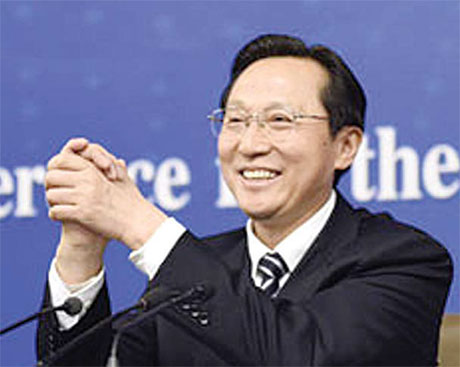
Han Changfu, the minister of agriculture, speaking on March 7.
GM CROPS: There have been claims recently of illegal planting of genetically modified crops in China. The country also imports large quantities of GM food.
What he said:
"Based on our assessment, illegal planting is rare and controllable.
"The agricultural ministry takes a lot of measures on the supervision of GM planting. Those measures have effectively prevented the illegal spread of GM crops, including illegal planting.
"The ministry pays high attention to the management of GM food security. Since 2008, when the government approved the transgenic technology project, China has consistently guided the development of GM technology."
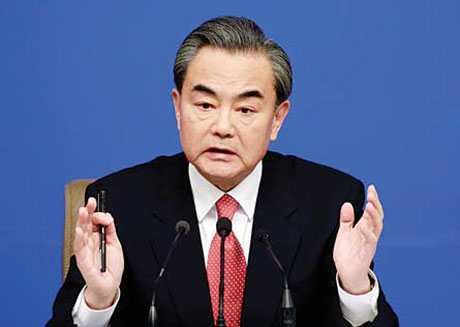
Wang Yi, the foreign minister, speaking on March 8.
KOREAN PENINSULA: The Democratic People's Republic of Korea conducted a nuclear test and a rocket launch this year, prompting China to call for an easing of tensions and resumption of the Six-Party Talks.
What he said:
"China will adopt an objective and impartial attitude during implementation of Resolution 2270 (the latest UN sanctions on the DPRK), which not only contains sanctions, but also reiterates support for the Six-Party Talks and asks the parties to refrain from taking any actions that might aggravate tensions. So in China's view, the resolution must be implemented in its entirety. Sanctions are just a necessary means. Maintaining stability is the pressing priority, and only negotiations can lead to a fundamental solution.
"At the moment, there is some saber-rattling on the Korean Peninsula and the situation is highly charged. If the tensions worsen and get out of control, it would be a disaster for all parties. As its largest neighbor, China will not sit by and see a fundamental disruption to stability on the peninsula or unwarranted damage to China's security interests. We strongly urge the parties to act with reason, and refrain from aggravating tensions.
"To resolve the issues on the peninsula, we have to adopt a multi-pronged approach and apply the right medicine. In terms of negotiation, China has put forward a proposal to pursue, in parallel track, the denuclearization of the peninsula and the replacement of the armistice agreement with a peace treaty. Denuclearization is the firm goal of the international community, while replacing the armistice is a legitimate concern of the DPRK. In our judgment, this is an equitable, reasonable and workable solution. Other parties have also suggested some ideas, including flexible contacts in a three-party, four-party or even five-party format. We are open to any and all initiatives that can help bring the nuclear issue back to the negotiating table.
"China and the Korean Peninsula are linked by common mountains and rivers; we have gone through thick and thin together. Today, China and the DPRK enjoy a normal state-to-state relationship built on a deep tradition of friendship. China both values friendship and stands on principle. We cherish our traditional bonds with the DPRK. If the country seeks development and security, we're prepared to help and provide support. But at the same time, we have an unwavering commitment to the denuclearization of the peninsula and we will not accommodate the DPRK's pursuit of nuclear and missile programs. One should see very clearly that only denuclearization can bring peace, only dialogue can provide the way out and only cooperation can bring win-win outcomes."
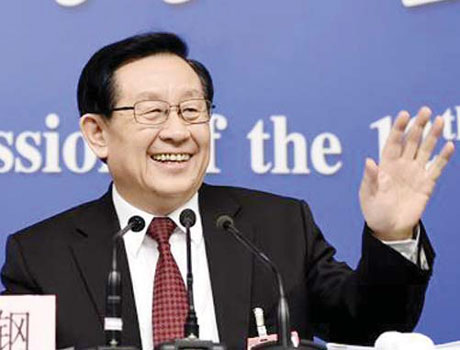
Wan Gang, the minister of science and technology, speaking on March 10.
MILITARY INTEGRATION: Chinese enterprises are paying close attention to technology and innovation. Some projects, such as in aerospace and deep-sea exploration, now involve a crossover between military and civilian enterprises.
What he said:
"A lot of technological programs and projects will start during the 13th Five-Year Plan (2016-20), and they will have close connections with our daily life. Those projects can support original innovation and breakthroughs in science knowledge, and they can make our life better and promote economic and social development.
"The government pays high attention to military and civilian integration. A lot of private businesses have taken part in research into and procurement of national defense equipment. Military and civilian integration can be fostered through using research facilities together. The most important point is that talent cultivation should promote military and civilian integration."
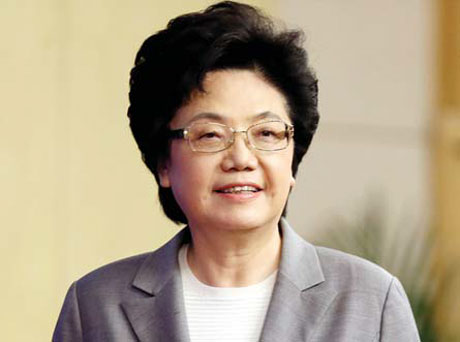
Li Bin, minister in charge of the National Health and Family Planning Commission, speaking on March 8.
FAMILY PLANNING: China further relaxed its family planning policy in January to allow all couples to have a second child.
What she said:
"We will stick to our family planning policy as a basic national policy, and will adjust and improve it in line with population development trends. China's population will reach a peak of about 1.45 billion before gradually declining to about 1.38 billion by 2050 - deemed an acceptable level given the natural resources.
"The labor population is expected to increase 30 million by 2050. And the number of old people will decrease. The population structure will become more balanced."
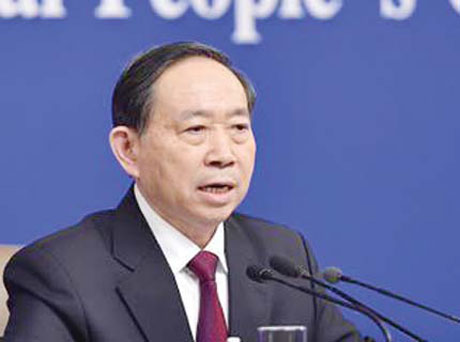
Yuan Guiren, the minister of education, speaking on March 10.
EDUCATION DEVELOPMENT: The BBC documentary Are Our Kids Tough Enough? Chinese School triggered a heated debate on differences and similarities between British and Chinese education.
What he said:
"China has a long and excellent history and tradition in education, and we have formed our educational characteristics and models. Chinese education puts more focus on teaching knowledge, basic skills training and discipline. Plus, thanks to the hard work of Chinese teachers and students, we have made excellent achievements in education and cultivated a lot of talent.
"But we also have shortcomings. For example, our students, especially in primary and middle schools, bear a heavy course load. Our students lack innovation. The major aim for promoting quality-oriented education is to promote innovation and practical abilities. We should develop our traditional education methods, and also absorb the successful education experiences and methods from other countries."
China Daily
(China Daily European Weekly 03/11/2016 page8)
Today's Top News
- Factory activity sees marginal improvement in November
- Venezuela slams US' 'colonial threat' on its airspace
- Xi: Strengthen cyberspace governance framework
- Takaichi must stop rubbing salt in wounds, retract Taiwan remarks
- Millions vie for civil service jobs
- Chinese landmark trade corridor handles over 5m TEUs






























